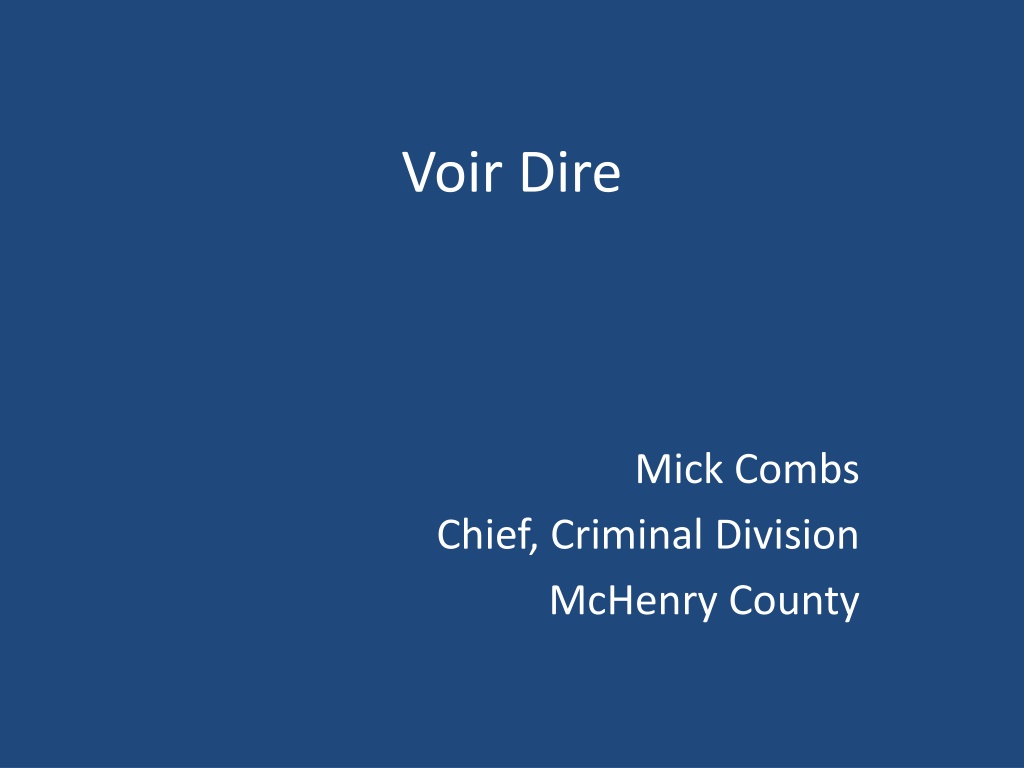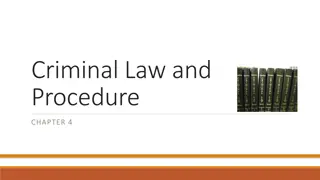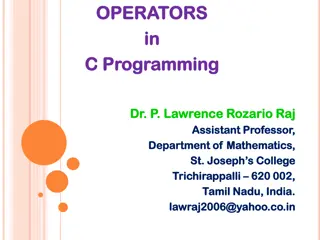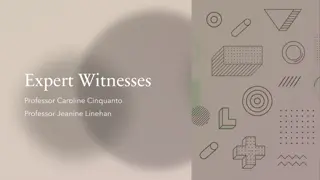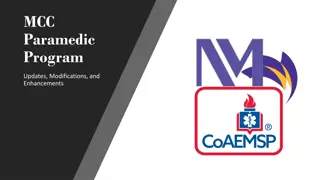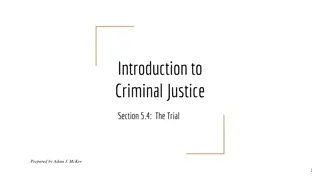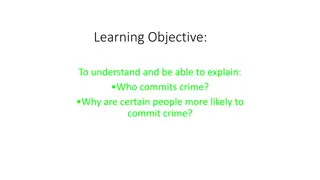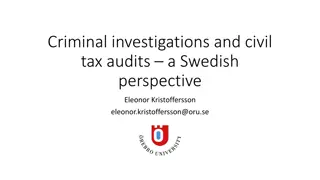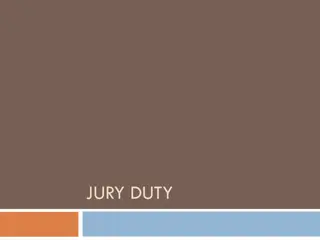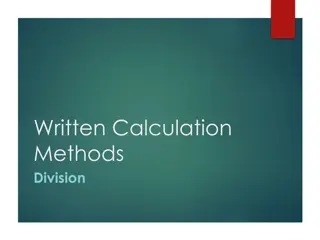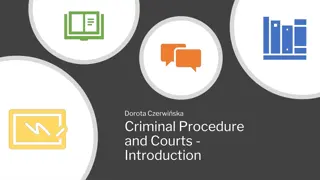Voir Dire in the Criminal Division of McHenry County
This text provides detailed information about the process of voir dire, specifically in the Criminal Division of McHenry County. It covers the Supreme Court Rule 431(a) regarding the examination of potential jurors, Zehr Principles, and Peremptory Challenges. The content emphasizes the importance of asking jurors about their understanding of key principles, such as the presumption of innocence and burden of proof. It also outlines rules regarding peremptory challenges based on the nature of the case.
Download Presentation

Please find below an Image/Link to download the presentation.
The content on the website is provided AS IS for your information and personal use only. It may not be sold, licensed, or shared on other websites without obtaining consent from the author. Download presentation by click this link. If you encounter any issues during the download, it is possible that the publisher has removed the file from their server.
E N D
Presentation Transcript
Voir Dire Mick Combs Chief, Criminal Division McHenry County
Supreme Court Rule 431 (a) The court shall conduct voir dire examination of prospective jurors by putting to them questions it thinks appropriate, touching upon their qualifications to serve as jurors in the case at trial. The court may permit the parties to submit additional questions to it for further inquiry if it thinks they are appropriate and shall permit the parties to supplement the examination by such direct inquiry as the court deems proper for a reasonable period of time depending upon the length of examination by the court, the complexity of the case, and the nature of the charges. Questions shall not directly or indirectly concern matters of law or instructions. The court shall acquaint prospective jurors with the general duties and responsibilities of jurors.
431 (b) Zehr Principles The court shall ask each potential juror, individually or in a group, whether that juror understands and accepts the following principles: (1) that the defendant is presumed innocent of the charge(s) against him or her; (2) that before a defendant can be convicted the State must prove the defendant guilty beyond a reasonable doubt; (3) that the defendant is not required to offer any evidence on his or her own behalf; and (4) that the defendant's failure to testify cannot be held against him or her; however, no inquiry of a prospective juror shall be made into the defendant's failure to testify when the defendant objects. The court's method of inquiry shall provide each juror an opportunity to respond to specific questions concerning the principles set out in this section. People v. Zehr, 103 Ill.2d 472, 469 N.E.2d 1062 Illinois Supreme Court (1984)
434(d) Peremptory Challenges 7 in a case in which the punishment may be imprisonment in the penitentiary (felony). 5 in all other cases (misdemeanor). In a single trial of more than one defendant, each defendant shall be allowed 5 in a case in which the punishment may be imprisonment in the penitentiary, and 3 in all other cases. The State shall be allowed the same number of peremptory challenges as all of the defendants.
Cause 705 ILCS 305/14 or that he is a party to a suit pending for trial in that court It shall not be a cause of challenge that a juror has read in the newspapers an account of the commission of the crime with which the prisoner is charged, if such juror shall state on oath that he believes he can render an impartial verdict according to the law and the evidence. In the trial of any criminal cause, the fact that a person called as a juror has formed an opinion or impression, based upon rumor or upon newspaper statements (about the truth of which he has expressed no opinion,) shall not disqualify him to serve as a juror in such case, if he shall upon oath state that he believes he can fairly and impartially render a verdict therein, in accordance with the law and the evidence, and the court shall be satisfied of the truth of such statement.
Questions must be limited to a brief and accurate statement of the law, followed by a question whether the juror could follow the law. Long hypothetical questions and previews of the evidence are objectionable because they constitute indoctrination and pre- trying of the case.
Goals 1. Pick Pro-prosecution Jurors. 2. Identify and eliminate bad jurors. 3. Establish a rapport and command the respect of the venire.
Attributes Of Pro-Prosecution Jurors Decisive and Disciplined. Positive attitude towards law enforcement. N.R.A. Gun owners. Social skills and can get along with fellow jurors. Employed, preferably in a Professional capacity. STEADY WORK history Dressed appropriately for court no sweatpants
Bad Jurors Social Workers Teachers College Professors Loners (People have little social skills ) Women with Sons who have been arrested or who have a child the same age of the defendant Criminals or people who have negative attitudes towards the Police
Rapport / Respect Remember you are having a conversation. Don t waste time. Keep it short and direct. If you know you are going to strike someone don t question them for 10 minutes. Don t ask irrelevant questions. Open ended questions invite conversation.
Personalize your approach Ask about Employment. Tell me about what you do at work on a day to day basis? Ask about Hobbies. What do you like to do in your spare time? Are you a member of any group, club or social organization?
Sample Questions for every case Have you or any family member or close friend ever been accused of committing an offense other than a minor motor vehicle offense? Have you or any family member or close friend ever been the victim of a crime, whether it was reported to law enforcement or not? If the State proves each element of the alleged offense(s) beyond a reasonable doubt, would you have any difficulty in returning a verdict of guilty? Would you have any difficulty or reluctance in accepting the law as explained by the court and applying it to the facts regardless of your personal beliefs about what the law should be or is?
Billy Hardison Case Have a plan for voir dire. What kind of people do you want on this jury. Think about your victim Tammy Knox.
Gun Questions Crime involves a gun ask about attitude towards guns in voir dire. It is proper to ask about jurors views about guns. People v. Sanders, 143 Ill.App.3d 402, 493 N.E.2d 1, (1st. Dist. 1986).
Alcohol and Drug questions Many people have strong opinions about drugs / alcohol. You may ask the venire about attitudes towards people who use drugs / alcohol. People v. Lanter, 230 Ill.App.3d 72, 595 N.E.2d 210 (4thDist. 1992) Do any of you have any feelings concerning the use of alcohol or drugs which would affect your ability to be a juror in this case, if there were testimony about alcohol or drugs. Lanter
People v. Bowel 111 Ill.2d 58, 488 N.E.2d 995 Illinois Supreme Court 1986 The purpose of the voir dire examination is to assure the selection of an impartial jury; it is not to be used as a means of indoctrinating a jury, or impaneling a jury predisposition. with a particular
INDOCTRINATION trial court in Bowel refused to ask prospective jurors these questions regarding mistaken identity: (1) Have you ever greeted a stranger as an acquaintance because you mistook the stranger? (2) Has a stranger ever greeted you because of a mistaken identity? Please explain.
Defense Questions in Voir Dire A defense lawyer's questions concerning a specific defense will be excluded. Bowel. Questions about beliefs concerning self- defense is improper. People v. Dunum 182 Ill.App.3d 92, 537 N.E.2d 898 (1989) Questions People v. Byer 75 Ill.App. 3d 658, 394 N.E.2d 632 (1979) about Compulsion improper.
Hypothetical Questions Don t let the defense attorney ask what if. Can t ask if you here these facts how would you vote? No listen to this scenario or what would you do if questions.
People v. Mapp 283 Ill.App.3d 979 670 N.E.2d 852 (1stDist. 1996) Error for a prosecutor to repeatedly inform jurors that they would hear two versions of events and then asked whether this would automatically create reasonable doubt in their minds.
